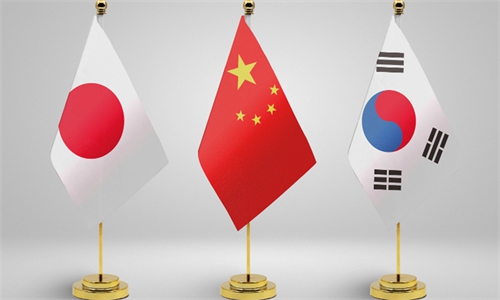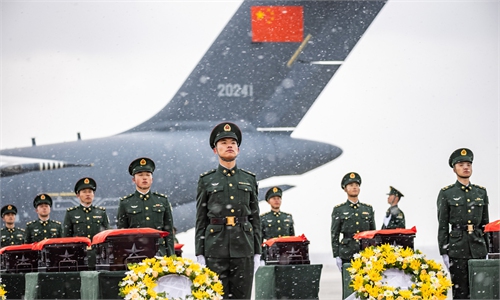
Illustration: Liu Xidan/GT
The tenth trilateral China-Japan-South Korea foreign ministers' meeting took place in Busan, South Korea, on Sunday, marking the first meeting in this format in more than four years. This development has raised expectations for the three countries to work together to maintain regional and global peace. It is also hoped that this will lead to more positive expectations and prompt a trilateral summit among the leaders of the three countries in the near future.
This meeting has attracted widespread attention from the international community, including countries in East Asia. For a long time, some countries outside the region have continuously exploited historical grievances and current conflicts among the three countries to manipulate factors such as geopolitical security for their own benefit. Furthermore, they pressure or lure Japan and South Korea to participate in building an anti-China encirclement. This has seriously undermined China's relations with South Korea and Japan, and hindered communication among the three countries.
The importance of the Sunday meeting lies in rebuilding trilateral trust, solidifying the foundation of communication, establishing a systematic cooperation model, and promoting the three countries' cooperative relationship to return to a healthy track. In particular, the meeting is expected to pave the way for an early summit meeting among the leaders of China, Japan and South Korea. It has provided a rare opportunity for envisioning a return to a healthy track for trilateral cooperation.
However, it is overly optimistic to expect the three countries' relationship to quickly enter a new period of flourishing cooperation.
First, external interference will continue to emerge. In recent years, Japan and South Korea have often used external factors to balance domestic affairs and relations with neighboring countries. With the easing of China-US relations, some proactive gestures from Japan and South Korea toward China cannot guarantee a complete reduction in their active cooperation with external forces against China, let alone fundamentally rejecting external intervention.
Second, some real challenges will not disappear overnight. In recent years, there have been complex changes in China's relations with Japan and South Korea. The continuously enhanced trilateral alliance between the US, Japan and South Korea not only increases the difficulty of exchanges between China, Japan and South Korea, but also intensifies the estrangement between them. Japan and South Korea's desire to use "multilateralism" to dilute China's influence and emphasize so-called economic security to constrain China's development is likely to persist despite the convening of the Sunday trilateral meeting.
Third, politicians in Japan and South Korea still evidently exhibit short-sighted thinking. In recent years, with the continuous conservative trend in the political ecology of Japan and South Korea and the increasing inward orientation of mainstream public opinion in these countries, more and more Japanese and South Korean politicians have chosen to cater to nationalism and populism. Driven by short-sightedness to maintain their ruling positions, they continuously create geopolitical panic and security risks that cause public concerns. This atmosphere makes it increasingly difficult to repair public opinion, sentiment and will for China-Japan-South Korea cooperation. Also, the Sunday meeting does not guarantee that the short-sightedness prevalent among politicians in Japan and South Korea will come to an end.
However, the signals of reconciliation conveyed by the foreign ministers of the three countries in this meeting are evident. The remarks by the Chinese, Japanese and South Korean foreign ministers are very positive. They indicate that trilateral cooperation will most likely get back on track, and that the groundwork will be laid to manage differences and expand consensus on cooperation.
In the future, the three countries should insist on communication unwaveringly and not be influenced by external interference. This communication covers how the three countries can establish a new way of solving regional issues on their own and overcome external interference with wisdom and courage.
They need to anchor exchanges and not be discouraged by difficulties. Resolving historical grievances between the three countries and addressing the current contradictions requires persistence in establishing mutual trust, reciprocity, connectivity, mutual assistance and even mutual learning through exchanges.
Additionally, they should focus on cooperation and not be disturbed by short-term challenges. China-Japan-South Korea cooperation continues to show its potential. It is expected that the cooperation areas, such as economy, trade, science, technology and environmental protection, mentioned at this trilateral foreign ministers' meeting, will lead the three countries to long-term cooperation with a broad perspective.
The author is director of the Institute of Northeast Asian Studies at Heilongjiang Provincial Academy of Social Sciences. opinion@globaltimes.com.cn


